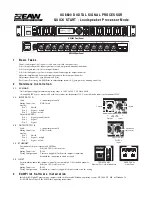
¨
4
OVEREASY SWITCH:
The O
VER
E
ASY
SWITCH toggles the MC6 between the OverEasy and hard knee modes of
compression. In OverEasy mode the ratio of compression changes slightly as the signal moves
through a threshold range, creating a softer compression effect. This can be very useful on
signals that are somethimes hard to tame, like vocals or guitars.The hard knee mode uses the
set threshold level as the absolute point at which compression will start to occur at the set
ratio amount, depending on the attack and release times set by the user or by the AUTO
SWITCH. See Figures 1 and 2 below for the differences between OverEasy and hard knee
compression
RATIO CONTROL:
Adjust this control to set the amount of compression applied to the input signal. Sliding the
control to the right increases the compression ratio from 1:1 (no compression) up to
°
:1
(where the compressor can be set up as a peak limiter, with faster ATTACK settings).
When an input signal is above the THRESHOLD setting, the RATIO setting determines the
number of decibels by which the input signal must be increased in level to produce a 1dB
increase in the signal level at the output of the MC6. A setting of 2:1 indicates an input/output
ratio wherein a 2dB increase in signal (above threshold) will produce a 1dB increase in output
signal. A setting of
°
:1 indicates that an infinite increase in input level would be required to
raise the output level by 1dB.
ATTACK AND RELEASE CONTROLS:
The ATTACK control sets the amount of time it takes the MC6 to begin compressing a signal
once the detector has sensed a signal above threshold. The ATTACK range is from FAST (for a
tighter and more noticeable compression effect with very little overshoot) to SLOW (for more
delayed, gradual compression). A very fast ATTACK setting will cause the MC6 to act like a
peak limiter even though RMS detection circuitry is used. Slower ATTACK settings cause the
MC6 to act like an RMS or average-detecting compressor/limiter.
The RELEASE control sets how fast the compression circuit returns the input to its original
level. The RELEASE rate is from fast (where compression follows the envelope of the program
material very tightly) to slow (for very smooth compression).
1:1
2:1
4:1
:1
-
15
-
10
-
5
0
+5
+15
+20
+10
INPUT LEVEL (dB)
OUTPUT LEVEL (dB)
-
15
-
10
-
5
0
+5
+15 +20
+10
RED
Below Threshold
Above Threshold
OverEasy Range
G
RE
E
N
AM
BE
R
YELLOW
-15
-10
-5
0
+5
+15
+20
+10
INPUT LEVEL (dB)
OUTPUT LEVEL (dB)
-15
-10
-5
0
+5
+15 +20
+10
1:1 Unity
2:1
4:1
:1
20:1
RED
Above Threshold
GREEN
Below Threshold
Rotation Point Threshold
Figure 1:
Hard Knee Compression Curve, and
Threshold LEDs.
Figure 2:
OverEasy¨ Compression Curve, and
Threshold LEDs.


































